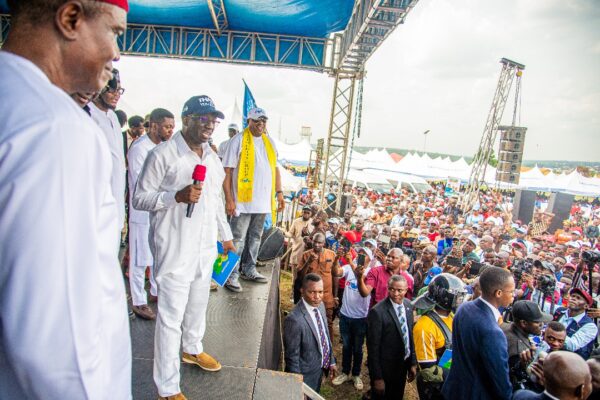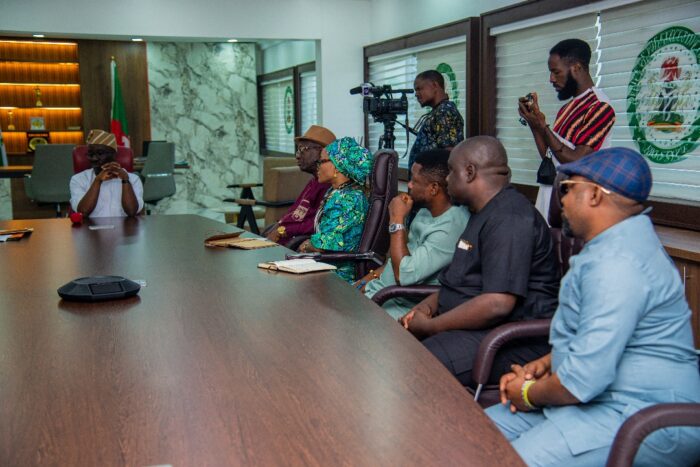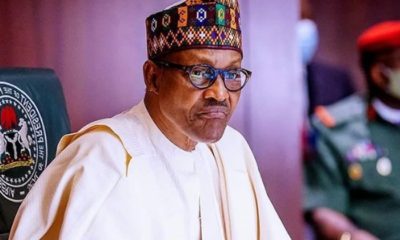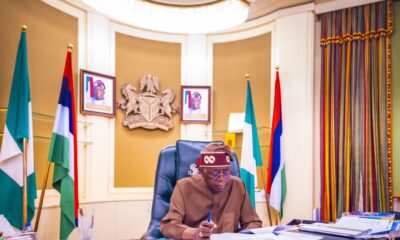Politics
Buhari assents to N17.127Trillion budget in company of Lawan, Gbajiabiamila
President Muhammadu Buhari on Friday in Abuja signed into law the 2022 Appropriation Bill and the 2021 Finance Bill.
The President signed the documents in the Presidential Villa in the presence of Senate President Ahmed Lawan, Speaker of the House of Representatives, Femi Gbajabiamila, and other members of the Federal Executive Council.
The President’s is in keeping with the tradition of restoring a predictable January to December fiscal year, as provided for in the Constitution of the Federal Republic of Nigeria,
Speaking at the event, the President said the 2022 Budget, just signed into law, provides for aggregate expenditures of N17.127 trillion, an increase of N735.85 billion over the initial Executive Proposal for a total expenditure of N16.391 trillion.
The President explained that N186.53 billion of the increase however came from additional critical expenditures that he had authorized the Minister of Finance, Budget and National Planning to forward to the National Assembly.
‘‘The Minister will provide the public with the details of the budget as passed by the National Assembly, and signed into law by me,’’ he said.
The President announced that as the 2023 Budget is going to be a transition budget, work will start in earnest to ensure early submission of the 2023-2025 Medium-Term Expenditure Framework and Fiscal Strategy Paper as well as the 2023 Appropriation Bill to the National Assembly.
He, therefore, directed Heads of Ministries, Departments and Agencies (MDAs) to cooperate with the Ministry of Finance, Budget and National Planning, more specifically with the Budget Office of the Federation, to realise this very important objective.
President Buhari also expressed strong reservations on the ‘‘worrisome changes’’ made by the National Assembly to the 2022 Executive Budget proposal.
He announced that he would revert to the National Assembly with a request for amendment as soon as the Assembly resumes to ensure that critical ongoing projects cardinal to this administration do not suffer a setback due to reduced funding.
The President recounted that during the presentation of the 2022 Appropriation Bill, he had stated that the fiscal year 2022 would be very crucial in his administration’s efforts to complete and put to use critical agenda projects, as well as improve the general living conditions of our people.
‘‘It is in this regard that I must express my reservations about many of the changes that the National Assembly has made to the 2022 Executive Budget proposal.
‘‘Some of the worrisome changes are as follows:
‘‘Increase in projected FGN Independent Revenue by N400 billion, the justification for which is yet to be provided to the Executive;
‘‘Reduction in the provision for Sinking Fund to Retire Maturing Bonds by N22 billion without any explanation;
‘‘Reduction of the provisions for the Non-Regular Allowances of the Nigerian Police Force and the Nigerian Navy by N15 billion and N5 billion respectively.
‘‘This is particularly worrisome because personnel cost provisions are based on agencies’ nominal roll and approved salaries/allowances;
‘‘Furthermore, an increase of N21.72 billion in the Overhead budgets of some MDAs, while the sum of N1.96 billion was cut from the provision for some MDAs without apparent justification;
‘‘Increase in the provision for Capital spending (excluding Capital share in Statutory Transfer) by a net amount of N575.63 billion, from N4.89 trillion to N5.47 trillion.’’
President Buhari also expressed concern in the reductions in provisions for some critical projects, including N12.6 billion in the Ministry of Transport’s budget for the ongoing Rail Modernisation projects; N25.8 billion from Power Sector Reform Programme under the Ministry of Finance, Budget and National Planning; N14.5 billion from several projects of the Ministry of Agriculture, and introducing over 1,500 new projects into the budgets of this Ministry and its agencies.
Further, the President also expressed his reservations on the following:
‘‘Inclusion of new provisions totaling N36.59 billion for National Assembly’s projects in the Service Wide Vote which negates the principles of separation of Powers and financial autonomy of the Legislative arm of government.
‘‘The changes to the original Executive proposal are in the form of new insertions, outright removals, reductions and/or increases in the amounts allocated to projects.
‘‘Provisions made for as many as 10,733 projects were reduced while 6,576 new projects were introduced into the budget by the National Assembly.
‘‘Reduction in the provisions for many strategic capital projects to introduce ‘Empowerment’ projects.
‘‘The cuts in the provisions for several of these projects by the National Assembly may render the projects unimplementable or set back their completion, especially some of this Administration’s strategic capital projects.
‘‘Most of the projects inserted relate to matters that are basically the responsibilities of State and Local Governments, and do not appear to have been properly conceptualised, designed and costed.
‘‘Many more projects have been added to the budgets of some MDAs with no consideration for the institutional capacity to execute the additional projects and/or for the incremental recurrent expenditure that may be required.’’
President Buhari declared that it was surprising that despite the National Assembly increasing projected revenue by N609.27 billion, the additional Executive request of N186.53 billion for critical expenditure items could not be accommodated without increasing the deficit, while the sum of N550.59 billion from the projected incremental revenues was allocated at the discretion of National Assembly.
‘‘I signed the 2022 Appropriation Bill into law to enable its implementation to commence on 1st January 2022.
‘‘However, I will revert to the National Assembly with a request for amendment and/or virement as soon as the Assembly resumes to ensure that critical ongoing projects that are cardinal to this administration, and those nearing completion, do not suffer a setback due to reduced funding.’’
On COVID-19 and budget implementation, the President said despite the lingering adverse effects of the pandemic, he was happy with the success recorded in the implementation of the 2021 Budget.
‘‘The sum of N3.94 trillion that was provided for the implementation of capital projects by MDAs during the fiscal year has been released fully.
‘‘To enable MDAs to complete the implementation of their 2021 capital projects and optimise the impact of the capital budget on the economy, they have been allowed to continue to expend the funds released for their 2021 capital budgets till 31st March, 2022,’’ he said.
The President commended the understanding and speedy action of the National Assembly on this matter.
‘‘As the 2022 Budget will be the last full year budget to be implemented by our Administration, its effective implementation is very critical for delivering our legacy projects, promoting social inclusion and strengthening the resilience of the economy.
‘‘The Ministry of Finance, Budget and National Planning will implement all measures required to ensure timely and targeted release of capital votes.
‘‘All MDAs are to effect early commencement of project implementation, while ensuring productive use of funds provided for achievement of the objectives set for their sectors.
‘‘Considering the incidence of new COVID-19 variants globally, we will ensure timely implementation of measures provided for in the 2022 Budget to contain the spread of the virus and protect our people.
‘‘We continue to count on the collaboration of the State governments in our effort to protect the lives and livelihood of our people.’’
To achieve the laudable objectives of the 2022 Budget, President Buhari pledged that the Federal Government would further intensify revenue mobilis
Politics
JUST IN: Court Nullifies Removal Of Lagos Assembly Speaker Obasa
The Lagos State High Court sitting in Ikeja has declared the removal of the reinstated Speaker of the State House of Assembly, Mudashiru Obasa, as illegal, unconstitutional, null, and void.
Delivering judgment on Wednesday, the court also set aside all proceedings and resolutions passed by the House on January 13, 2025, the day Obasa was removed from office.
Obasa had dragged the Lagos State House of Assembly and Mojisola Meranda — who was appointed Speaker following his removal — before the court, challenging the legality of the action.
READ MORE: Court Adjourns Obasa’s Suit Challenging Removal As Lagos Speaker To March 10
In its ruling, the court held that the process leading to Obasa’s removal did not comply with constitutional provisions, rendering the exercise invalid.
The judgment effectively reinstates Obasa as the legitimate Speaker of the Lagos State House of Assembly, while invalidating all legislative actions carried out during Meranda’s brief tenure.
Politics
2027: Okpebholo Banks On Edo, Delta States To Swing Tinubu’s Reelection

With permutations for 2027 elections already play high on the cards of Nigerian politicians, Edo State Governor, Senator Monday Okpebholo is banking on Edo and Delta States to team up and swing victory for President Bola Ahmed Tinubu’s re-election.
Biztellers reports that his calculation is informed by the massive defection of notable politicians into the ruling All Progressives Congress (APC) in both States.
Gov Okpebholo made the assertion while welcoming the Chairman of the Niger Delta Development Commission (NDDC), Chiedu Ebie, who led the members of the Unity Group to join the APC.
Notable among other party stalwarts at the occasion were the National Chairman of the APC, Abdullahi Ganduje and the party’s South-South leaders.
ALSO READ: Oyo Police Arrest Three Over Hijacking Of Petrol-Laden Truck
According to Okpebholo “just like Edo, Delta is ready to witness practical governance under APC.”
Beaming with joy, Gov Okpebholo added, “It is our turn to shine in the South South. It is now your turn in Delta. It is happening here, as it happened in Edo State. President Bola Ahmed Tinubu is doing very well for the nation. He is repairing the foundation of the country for better prosperity. Because of that, in Edo State, we have started. We said 2027 is already possible. It is also possible here in Delta. I am here to welcome my brother, Chiedu Ebie.
“Chiedu is an intelligent young man who knows when to move. It is time for Delta to move, and it is starting here with Ika people.”
Receiving the decampees, Alh Ganduje, described the Delta Unity Group as great fighters of democracy, who have provided a strong vehicle that will lead APC to the Delta State Government House in 2027.
According to the APC national Chairman, “we have the three Senators now. We have members of the House of Representatives and State Assembly members, and over 60 percent of the followers of PDP have now joined the APC. We are assured of taking over this State come next election.
“We are not surprised because of the timber and caliber of politicians you have in Delta State in the APC. What we require now is unity. Unity of purpose and unity to win election. So we can provide quality governance to the people of Delta State.
“Very soon, we will organize a stakeholders meeting for all those major stakeholders because they are all good people. They are all wise people. They are all intelligent people, and they are all democrats. So, all of them will be convened for unity, like the Delta Unity Group.”
On his part, the Chairman of the NDDC Governing Board, Ebie, noted that their conviction to join the party was borne out of the love for good governance and party inclusiveness which the President Bola Ahmed Tinubu has demonstrated.
Earlier, while at the Palace of the Dein of Agbor, Dr Benjamin Ikenchukwu, the Keagborekuzi the first, called on President Bola Ahmed Tinubu to ensure peace and security across the country for the needed development in the country.
Present at the rally were Senator representing Delta North, Ned Nwoko; Chairman House Committee on NDDC, Hon. Teke Ibori-Swenu; former Deputy Senate President, Omo Agege, among other party big wigs.
Politics
Okpebholo Excites Edo Workers With Welfare Package

Edo State Governor, Senator Monday Okpebholo has assured that his administration would do everything within its powers to take care of Edo State civil servants and make them happy.
He made the pledge on Friday when he received Executives of Nigerian Labour Congress (NLC), Edo State Chapter, led by its Acting State Chairman, Comrade Bernard Egwekhide.
Egwekhide said they were in Government House to congratulate the Governor on his recent victory at the governorship election tribunal that affirmed his victory in the September 21, 2024 governorship election.
On his part, the Governor said whatever Edo State workers are enjoying in the state is the responsibility of his administration to do because it is worker friendly.
ALSO READ: Uromi Killings: FG, Edo State Set Up Fact-Finding Committee
Okpebholo said, “Whatever we are doing, which is favouring Edo workers, is done because it is our responsibility as a government. Edo people voted for us to work for them, and that is what we are doing to ensure life is made better for our people, including the workers.
“We embrace transparency in all what we do as a government to enable the people to trust us as we are not afraid of criticism. Positive criticism will put us on our toes to work harder for Edo people.
“The renewed hope agenda of the president has given us room and platform to perform and serve Edo people better as we embark on practical governance.
“We are doing everything in the State to ensure peace, unity, growth, and development. That is why we ensure smooth collaboration amongst the three tires of government. In all we do in the State, we ensure the three Senatorial zones are carried along.”
The NLC acting chairman, Egwekhide, commended the Governor for his developmental strides and the friendly environment created for Edo State workers to operate.
He said the visit was necessary as the body had come to congratulate the Governor for his deserved victory at the election petition tribunal in Abuja.
According to him, “Workers in Edo State are proud of you for the developmental strides in the State. You have created a friendly relationship between your administration and Edo workers as you have always taken steps to favour Edo State workers.
“Without asking, workers received their 13th month. You raised the subvention of Ambrose Ali University (AAU) from N41 to N500 million. You regularized casual workers in Edo State. You increased what is due pensioners monthly from N50 million to N1 billion naira for both local and State pensioners.”
He noted that a committee has been set up to look into the compulsory pension scheme, which has become a burden on retired civil servants, adding that the report will be submitted to him for his action.
“We thank the governor for several employments given to our people in the very short time in office,” he added.
In a related development, Gov Monday Okpebholo also received the new branch controller, Central Bank of Nigeria (CBN), Edo State, Apanke Utande who was on a courtesy visit to Government House, where the Governor urged him to collaborate with his administration to improve the lives of Edo people.














